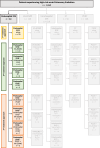Prehospital thrombolytic treatment of high-risk acute pulmonary embolism
- PMID: 40624546
- PMCID: PMC12235934
- DOI: 10.1186/s13054-025-05465-w
Prehospital thrombolytic treatment of high-risk acute pulmonary embolism
Conflict of interest statement
Declarations. Ethics approval and consent to participate: This study was conducted in accordance with the Declaration of Helsinki and approved by the ethics committee at Ludwig-Maximilians-Universität (LMU) Munich (IRB 22–0193). Consent for publication: Not applicable. Competing interests: The authors declare no competing interests.
Figures
References
-
- Kahn SR, de Wit K. Pulmonary embolism. N Engl J Med. 2022;387:45–57. - PubMed
-
- Konstantinides SV, Meyer G, Becattini C, et al. 2019 ESC guidelines for the diagnosis and management of acute pulmonary embolism developed in collaboration with the European Respiratory Society (ERS). Eur Heart J. 2020;41:543–603. - PubMed
-
- Janata K, Holzer M, Kürkciyan I, et al. Major bleeding complications in cardiopulmonary resuscitation: the place of thrombolytic therapy in cardiac arrest due to massive pulmonary embolism. Resuscitation. 2003;57:49–55. - PubMed
-
- Javaudin F, Lascarrou J-B, Le Bastard Q, et al. Thrombolysis during resuscitation for out-of-hospital cardiac arrest caused by pulmonary embolism increases 30-day survival: findings from the French national cardiac arrest registry. Chest. 2019;156:1167–75. - PubMed
Publication types
LinkOut - more resources
Full Text Sources


